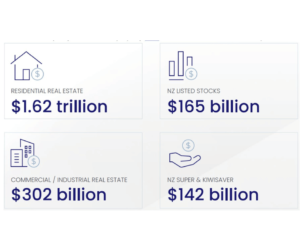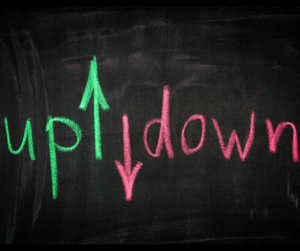Riding The Rollercoaster of Property
Well, here we are at the end of another interesting year in property 2022 – and it’s been a real rollercoaster!
Here is an interesting graph about NZ asset classes (as at Sept 2022). You can see that we as a nation are pretty committed to property – no wonder we call it our national sport!
What surprised me is that the value of mortgages in NZ is just $341billion – that’s just 21% of the property value meaning 70% of the value is in household equity.

One of the things people have said will drive house prices down is the number of people coming off fixed rates to high(er) rates.
Currently 44% of mortgages (by value) are fixed and due to roll over next year.
That’s well down from the peak of 66% last year.
I’ve just read an interesting article by our favourite economist, Tony Alexander.
In it, he discussed why people treat the housing market so differently from other assets such as those shown above.
The main reason is that buying a house is an emotional thing, and it’s based on buying at the best price, but more importantly on how the property is going to suit your/your family’s needs.
And this means that value is hard to determine – a house’s value can vary tremendously for two different buyers.
Tony says
“This confusion between housing as an investment asset and a home means people can easily make bad decisions with regard to their buying and selling. We are at one of those particular points of confusion currently.”

Who Is Buying?
Firstly, home ownership, as a percentage of the population, is currently at its lowest in almost 70 years. In the 1990’s it peaked at 73.8% (of the population owned their own home) and this dropped to 64.5% in 2013. It rose again to a high of 67.8%in 2001 but since then has trended downwards and is currently estimated to be at 63.8% by 2024.
Most of this change has come about as a result of first home buyers being unable to afford to buy into the market – especially in Auckland.
The general sentiment from agents across NZ is that there are fewer first home buyers in the market than we have seen in a long time, despite all the help (rise in price caps for First Home Grants, introduction of the First Home Partner program and First Home Loans price caps being lowered).
Unfortunately the banks’ stress tests and the increase in mortgage rates have made purchasing your first home even harder.
Given All The Above Information, Are We Any Wiser About Where House Prices Are Going?
We are still in a buyer’s market, with prices still being forced lower by a combination of more properties on the market and an ongoing rise in interest rates making buyers very wary of taking action.
You may have noticed how many properties are being passed in at auction and then appearing as ‘By Negotiation’ or with a price.
Good properties are selling quite well with the occasional auction having 5-10 bidders, but any properties with any fish hooks at all will be lucky to get anyone bidding at auction.
So while we are in this current market most people are listening to the pundits saying that prices are going to continue to fall for most of next year and this encourages them to sit on their hands.
But according to many economists (led once again by Tony Alexander) we are already at, or very close to, the bottom of the market.
So while prices may fall another 1% what we can be sure of is that mortgage rates are going to increase – what would you rather do – pay 1 or 2% more for your $1m property or pay an extra 2% interest on a slightly cheaper property for the next 5-10 years?

Selling In 2023?
If you are going to sell in the next twelve months you need to be sure you use a very good agent.
Here is some advice on selecting the right agent for your sale.
The process of deciding on an agent begins with doing some research.
Many people feel they need a local agent: Today it’s far less about which agent knows more about the area and recent sales because all of this information is available online.
What is far more important is that the agent has the key skills (sales, negotiation, marketing and technology) and a good success rate (i.e. lots of successful sales) backed up by client testimonials.
For your part, it’s also a good idea to research homes for sale in your neighbourhood – and how much they are selling for.
It’s even better to attend a few open homes, and auctions, as this will allow you to see how well the different agents conduct themselves.
Then you should get up to three different agents in to appraise your property.
Agents appraising your home will use comparable sales to provide you with an estimated selling price for your home in the current market.

Don’t allow yourself to be swayed by a flattering price.
This is a common tactic to get the listing, and once listed there will be plenty of communication on how the market is not seeing the price at that level.
An appraisal also provides an opportunity for you to ask agents what services they provide, the strategy behind their marketing and advertising campaign and what their commission fees are.
When looking into commission fees don’t let commission make up the bulk of your decision-making, as while you may want to find an agent who asks for the cheapest rate, the cheapest agent may not necessarily be the best agent.
As mentioned above: Focus on the agent’s skills and on their success rate.
A skilled agent can negotiate the final sale with one or more interested buyers, achieving the best possible outcome for what is possibly your most valuable asset.
Trying to sell your house ‘on the cheap’ is very likely to cost you significantly in the long run.
